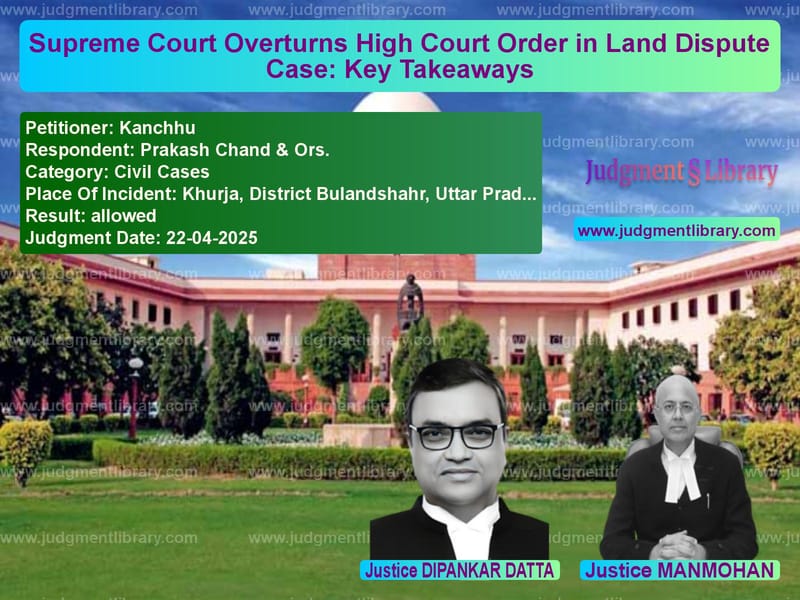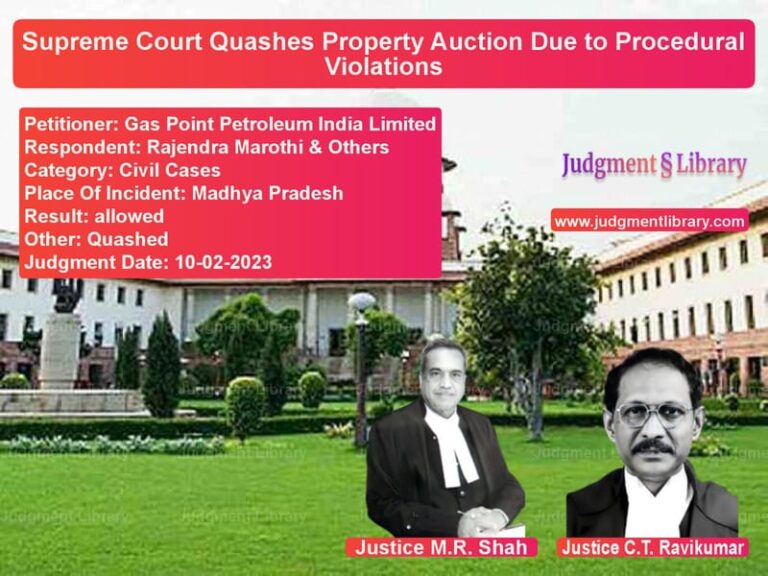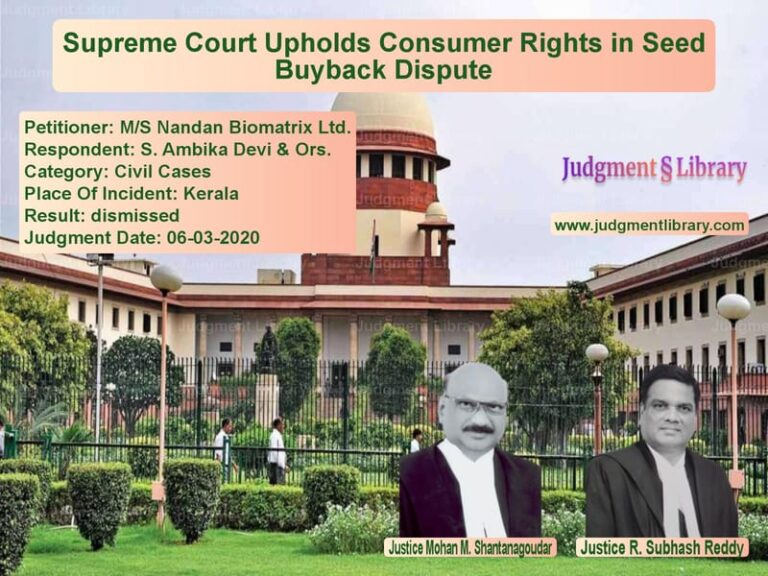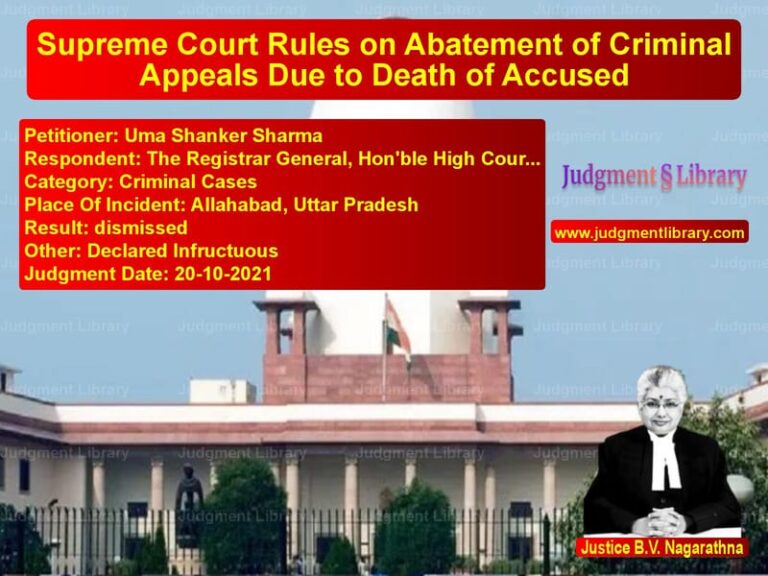Supreme Court Overturns High Court Order in Land Dispute Case: Key Takeaways
The Supreme Court of India recently delivered a significant judgment in the case of Kanchhu vs. Prakash Chand & Ors., setting aside the order of the High Court of Judicature at Allahabad. The case revolved around a land dispute where the appellant, Kanchhu, had sought the cancellation of a sale deed allegedly obtained through fraud. The respondents, Prakash Chand and others, had challenged the ex-parte decree passed by the trial court, which was initially upheld by the appellate court but later overturned by the High Court. The Supreme Court’s decision highlights critical aspects of procedural diligence, the scope of Article 227 of the Constitution, and the rights of defendants in ex-parte proceedings.
The Facts of the Case
The appellant, Kanchhu, filed a civil suit in 1987 for the cancellation of a registered sale deed dated 5th September 1984, alleging fraud. The respondents, who were the defendants in the suit, claimed that Kanchhu was their brother and had filed the suit with ill motives. After filing their written statement in 1987, the respondents repeatedly sought adjournments, leading the trial court to set them ex-parte on 24th April 1991. The suit was eventually decreed ex-parte on 17th August 1991.
The respondents filed an application under Order IX Rule 13 of the Code of Civil Procedure (CPC) to set aside the ex-parte decree, along with an application under Section 5 of the Limitation Act, 1963, seeking condonation of delay. The trial court rejected the application for condonation of delay in 1997, but the revision court allowed it in 1999, directing the trial court to decide the Order IX Rule 13 application on merits. The trial court dismissed the application in 2002, and the appellate court upheld this decision in the same year.
The respondents then filed a writ petition under Article 227 of the Constitution, which was dismissed as infructuous on 1st December 2011. However, the High Court granted them two months to seek recall of the order. The respondents filed the recall application in June 2018, nearly seven years later, citing that their counsel had not informed them about the dismissal. The High Court allowed the recall application, condoned the delay, and ultimately allowed the writ petition, setting aside the ex-parte decree.
Contentions of the Parties
Mr. Partha Sakha Datta, learned senior counsel for the appellant, argued that the High Court’s order was indefensible. He criticized the learned Judge for applying incorrect tests and failing to consider the respondents’ lack of diligence. He emphasized that the respondents had failed to show sufficient cause for their absence during the trial and that the High Court’s order was based on irrelevant and illogical observations.
On the other hand, Mr. Sukumar Pattjoshi, learned senior counsel for the respondents, appealed to the conscience of the Court to uphold the High Court’s order. He contended that the impugned order ensured a fair trial, which the respondents had missed earlier due to reasons beyond their control. He argued that the High Court’s discretion should not be interfered with.
Supreme Court’s Analysis
The Supreme Court, after hearing both parties and perusing the records, found the High Court’s approach flawed. The Court noted that the respondents had failed to demonstrate sufficient cause for their absence during the trial. The medical certificate submitted by the respondents, claiming illness from 15th August to 30th November 1991, was not substantiated by any evidence, as neither the respondent nor the doctor testified. The Court also observed that the respondents had sought adjournments on ten previous occasions and had absented themselves from the proceedings long before the alleged illness.
The Supreme Court criticized the High Court for not examining the merits of the case or the orders passed by the trial and appellate courts. The High Court had set aside the ex-parte decree on the ground that the trial court had not considered the written statement while passing the judgment. The Supreme Court clarified that a defendant set ex-parte loses the right to produce evidence and is only entitled to cross-examine the plaintiff’s witnesses. The trial court’s judgment, therefore, could not be faulted for not considering the written statement in detail.
The Court further emphasized that vigilance and diligence are essential in legal proceedings. The respondents’ lack of diligence was glaring, and their explanation for the delay was unsatisfactory. The Supreme Court concluded that the High Court’s order was based on misconceptions of law and could not be sustained.
Conclusion
The Supreme Court allowed the appeal, set aside the High Court’s order, and upheld the appellate court’s decision dated 8th October 2002. The writ petition filed by the respondents stood dismissed, and the ex-parte decree passed by the trial court was restored. The Court’s judgment serves as a reminder of the importance of procedural diligence and the limited scope of interference under Article 227 of the Constitution.
The case also underscores the principle that litigants cannot blame their lawyers for their own lack of vigilance. As the Court observed, “by no means should we be understood to lay down any law that whenever a litigant places the blame on the lawyer by pleading that it was the lawyer’s fault or mistake that resulted in his (litigant’s) misfortune, the same has invariably to be accepted.”
This judgment is a significant precedent for civil cases involving ex-parte decrees and the condonation of delay, reaffirming the judiciary’s commitment to upholding procedural fairness and the rule of law.
Petitioner Name: Kanchhu.Respondent Name: Prakash Chand & Ors..Judgment By: Justice DIPANKAR DATTA, Justice MANMOHAN.Place Of Incident: Khurja, District Bulandshahr, Uttar Pradesh.Judgment Date: 22-04-2025.Result: allowed.
Don’t miss out on the full details! Download the complete judgment in PDF format below and gain valuable insights instantly!
Download Judgment: kanchhu-vs-prakash-chand-&-ors.-supreme-court-of-india-judgment-dated-22-04-2025.pdf
Directly Download Judgment: Directly download this Judgment
See all petitions in Property Disputes
See all petitions in Contract Disputes
See all petitions in Specific Performance
See all petitions in Damages and Compensation
See all petitions in Judgment by Dipankar Datta
See all petitions in Judgment by Manmohan
See all petitions in allowed
See all petitions in supreme court of India judgments April 2025
See all petitions in 2025 judgments
See all posts in Civil Cases Category
See all allowed petitions in Civil Cases Category
See all Dismissed petitions in Civil Cases Category
See all partially allowed petitions in Civil Cases Category







